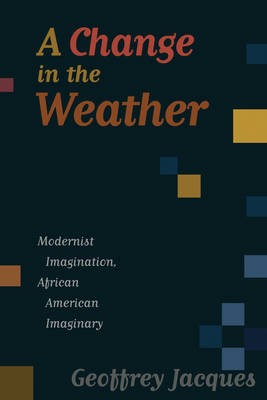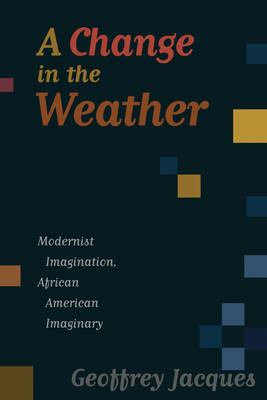
- Afhalen na 1 uur in een winkel met voorraad
- Gratis thuislevering in België vanaf € 30
- Ruim aanbod met 7 miljoen producten
- Afhalen na 1 uur in een winkel met voorraad
- Gratis thuislevering in België vanaf € 30
- Ruim aanbod met 7 miljoen producten
Zoeken
A Change in the Weather
Modernist Imagination, African American Imaginary
Geoffrey Jacques
Paperback | Engels
€ 39,45
+ 78 punten
Omschrijving
This book explores the impact of African American culture on modernist poetic language by placing black literature and culture at the center of an inquiry into the genealogy of avant-garde poetics. Geoffrey Jacques looks at how blackface minstrelsy, ragtime, vernacular languages, advertising copy, Freud's idea of the Uncanny, vaudeville, the cliché, and Tin Pan Alley-style song all influenced modernist poetry. In a key insight, Jacques points out that the black urban community in the United States did not live in ghettos during the years before World War I, but in smaller enclaves spread out among the general population. This circumstance helped catalyze African American culture's dramatic and surprising impact on the emergent avant-garde. By using a wide range of theoretical tools, Jacques poses new questions about literary, cultural, and social history, the history and structure of modernist poetic language, canon formation, and the history of criticism.This contribution to the ongoing debate over early twentieth-century culture presents modernism as an interracial, cross-cultural project, arguing for a new appreciation of the central role black culture played within it. Writers and artists whose works are discussed include Marianne Moore, Charles Chesnutt, Jean Toomer, Wallace Stevens, James A. Bland, Paul Laurence Dunbar, Gertrude Stein, Bert Williams, Zora Neale Hurston, Samuel Beckett, W. C. Handy, Hart Crane, and Clement Greenberg.
Specificaties
Betrokkenen
- Auteur(s):
- Uitgeverij:
Inhoud
- Aantal bladzijden:
- 240
- Taal:
- Engels
Eigenschappen
- Productcode (EAN):
- 9781558496880
- Verschijningsdatum:
- 1/05/2009
- Uitvoering:
- Paperback
- Formaat:
- Trade paperback (VS)
- Afmetingen:
- 150 mm x 224 mm
- Gewicht:
- 294 g

Alleen bij Standaard Boekhandel
+ 78 punten op je klantenkaart van Standaard Boekhandel
Beoordelingen
We publiceren alleen reviews die voldoen aan de voorwaarden voor reviews. Bekijk onze voorwaarden voor reviews.











